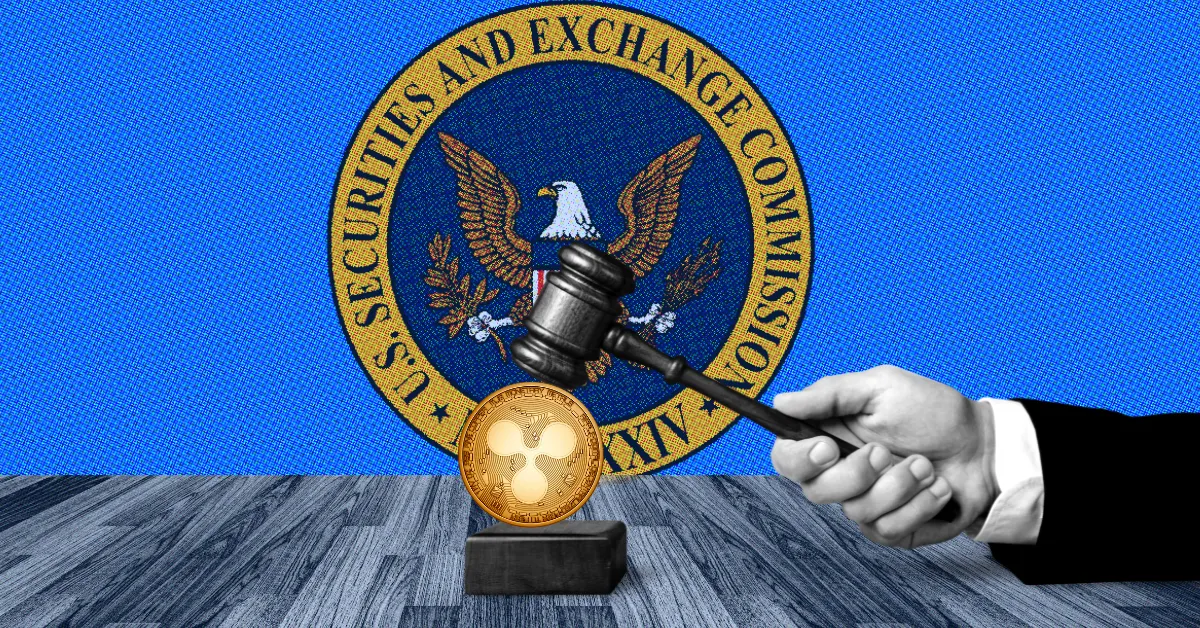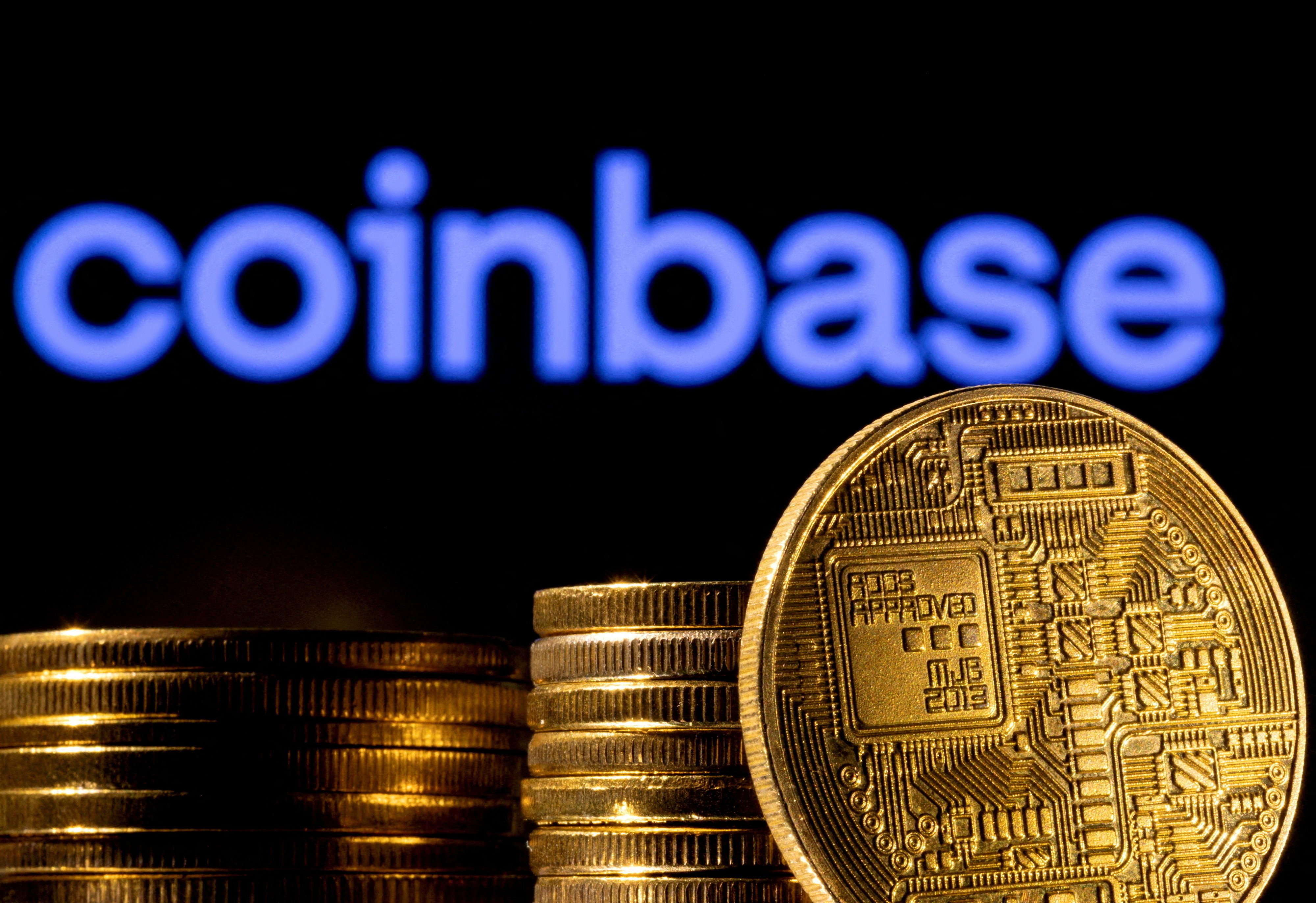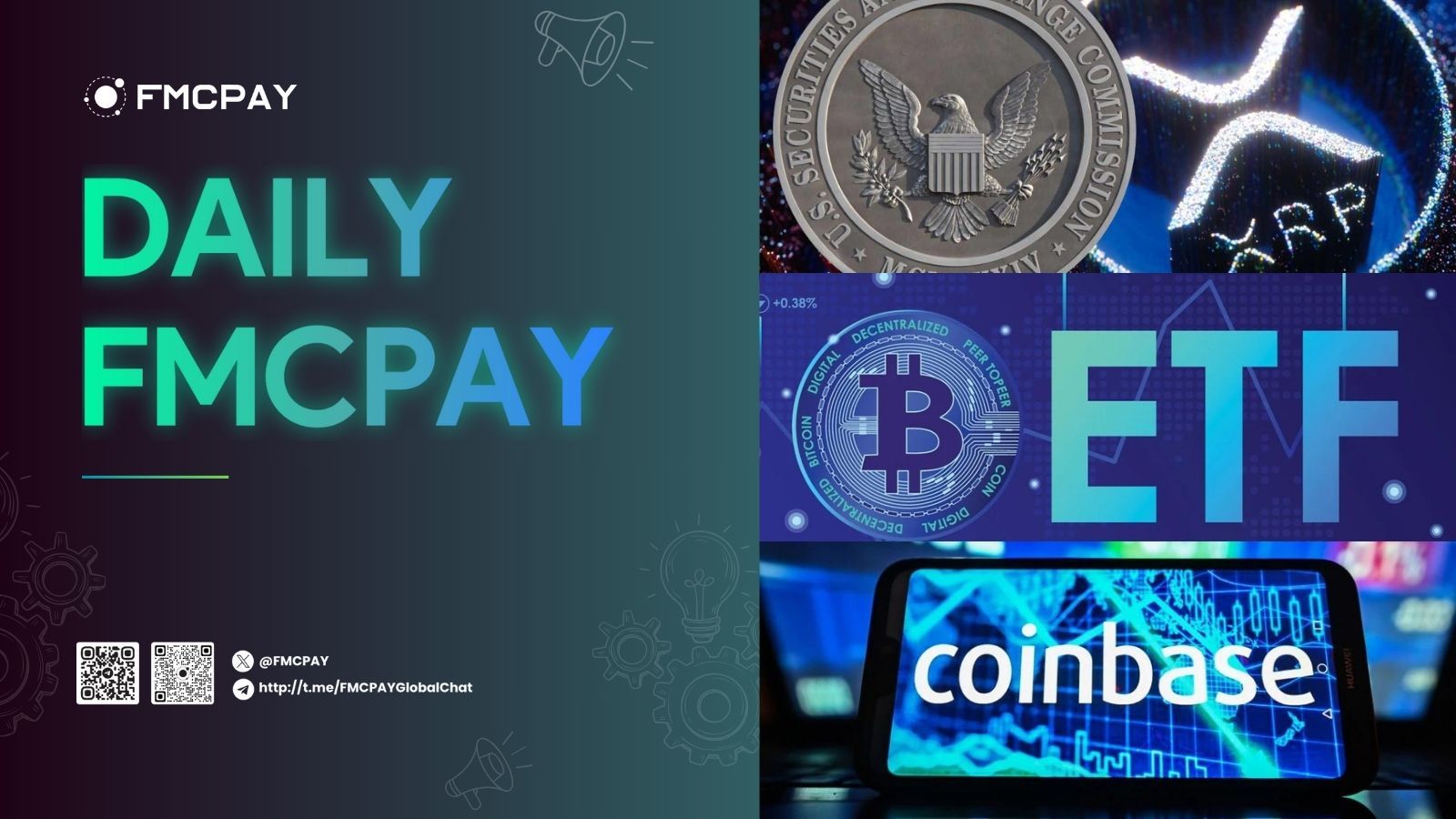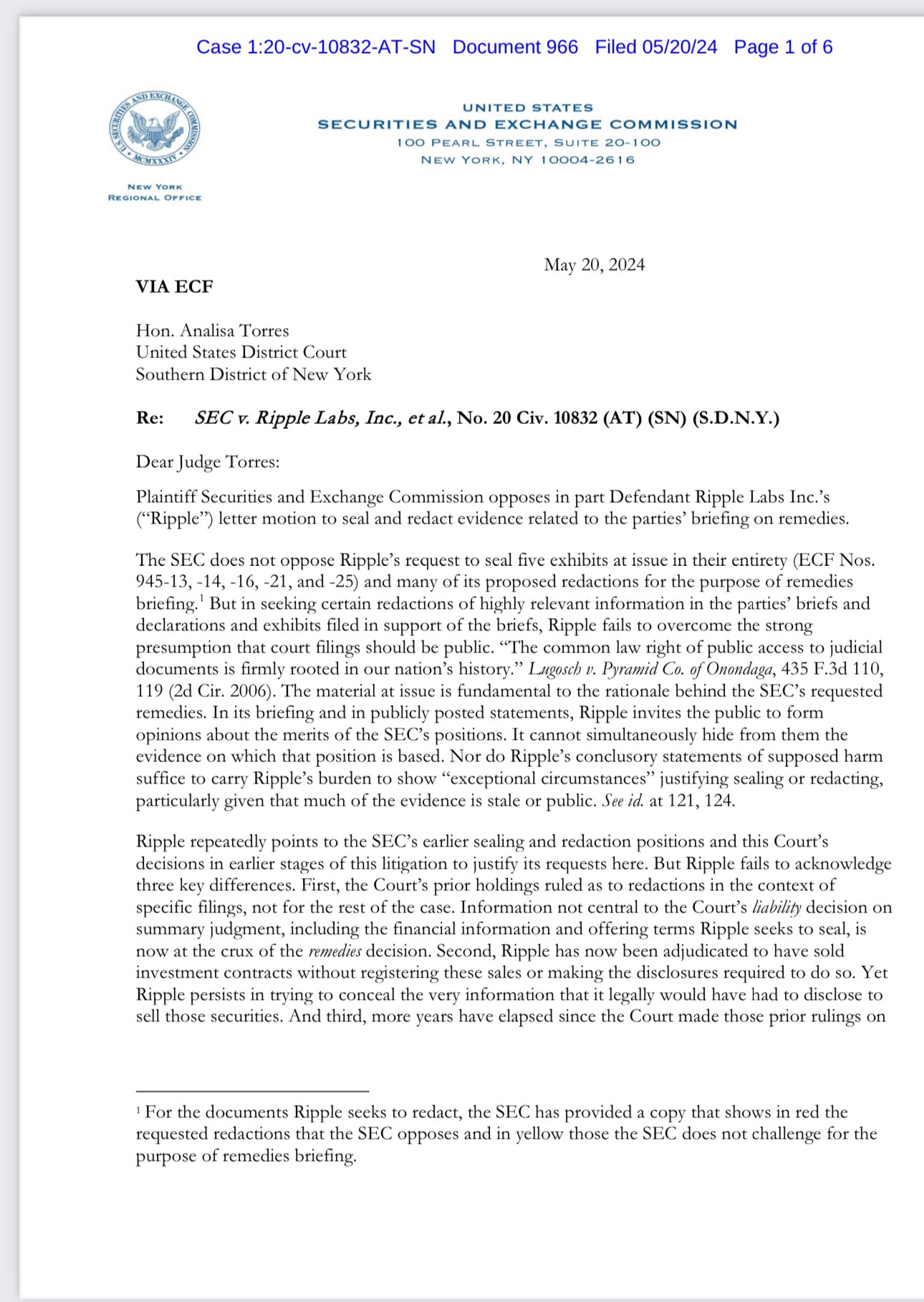XRP Lawsuit: US SEC disputes Ripple’s request to conceal evidence from the public, arguing that the specifics are crucial to the resolution of the remedies phase.

Ripple v. SEC lawsuit: Partially opposed by the U.S. Securities and Exchange Commission (SEC) is Ripple’s move to redact and seal evidence pertaining to documents and a remedies brief. In the remedies document it filed on March 22, the SEC requests that the court issue an order requiring Ripple’s business data to be made public.
Given the significant dangers to Ripple Labs, Ripple has previously asked the court to retain the financial reports, information on post-complaint XRP institutional sales, and other private facts redacted and sealed.
SEC claims to make Ripple’s record public
As disclosed in the most recent court filing on May 21, the U.S. SEC has responded to Ripple’s move to seal and redact and opposes the motion in part. According to the SEC, Ripple’s request to “conceal financial and securities sales information” from the public is illegal, and the information at hand—including financial data and other specifics—is essential to the remedies that are being sought.
According to the SEC, Ripple’s requests for redaction would conceal material that the public needs to know in order for the court to make determinations regarding remedies and the amount of fines. The details include amount of Ripple’s current assets (relevant to penalty amount), amount of recent sales (injunctive relief and penalties), revenues & expenses (disgorgement), and the size of discounts to some institutional investors (investor harm).
Additionally, the regulator claims that Ripple did not provide sufficient proof of how access to publicly available information would cause a significant harm that would call for protection. It went on to say that Ripple’s reliance on previous court sealing approvals in the current issues is untenable, that the financial figures and other material are stale and outdated, and that certain evidence is already publicly available.
XRP price jumps, Whales selling holdings
The price of XRP increased by 5% over the previous day to trade at $0.535. $0.507 is the 24-hour low, while $0.542 is the 24-hour high. Furthermore, a surge in trader interest is indicated by the trading volume, which has surged by more than 150% in the last day.
The latest increase coincided with the SEC’s request that exchanges amend their 19b-4 reports, increasing the likelihood of a spot Ethereum ETF approval to 75%. Analysts predict that the price will remain below these levels for the remainder of the year since a significant price recovery depends on the triangle pattern breaking out.
Whales have liquidated part of their XRP holdings in the interim while the SEC files a protest against Ripple’s request to keep the financial information and institutional sales data private.
Check Out the Latest Prices, Charts, and Data of XRP/USDT
Spot bitcoin ETFs record net inflows for the sixth day in a row
On Monday, the eleven bitcoin exchange-traded funds in the United States had a daily net inflow of $241.12 million.

On Monday, U.S. spot bitcoin exchange-traded funds reported receiving $241.12 million, marking another day of overall net inflows. The funds have witnessed inflows for six days running, which is the longest winning run since mid-March.
According to SoSoValue statistics, funds contributed by Ark Invest and 21Shares’ spot bitcoin ETF totaled $68 million. BlackRock’s IBIT, on the other hand, experienced a net inflow of $66 million. Bitwise’s spot ETF had an inflow of $28 million, while Fidelity’s FBTC reported a net inflow of $64 million.
Grayscale’s GBTC, which had been experiencing net outflows until recently, had net inflows of $9 million. $5 million was contributed to WisdomTree’s BTCW fund.
During $1.18 billion in net inflows have been made into the 11 top bitcoin ETFs combined during the last six days. With this, the overall net inflows since January have increased to $12.87 billion. However, as seen by The Block’s data dashboard, aggregate flows for the 11 ETFs are still well below their March peak.
Meanwhile, the data shows that the price of bitcoin increased by 6.35% during the previous day to surpass $71,000. The likelihood that spot ether ETFs would be approved by the US Securities and Exchange Commission has increased from 25% to 75%, according to Bloomberg ETF experts Eric Balchunas and James Seyffart.
Coinbase taps Ex-Rep. Kendrick Meek for advisory council as house gears up for crypto legislation vote

According to a Monday story in The Hill, former congressman Kendrick Meek (D-Fla.) has joined Coinbase’s worldwide advisory council.
Coinbase’s chief policy officer, Faryar Shirzad, praised Kendrick for his seasoned leadership and emphasized the need of modernizing the system in light of the fact that 52 million Americans are now participating in the cryptocurrency market.
Meek’s appointment to the council occurs right before the Financial Innovation and Technology for the 21st Century Act (FIT21) is up for vote in the House.
Very honored to have @KendrickMeek join the @coinbase Global Advisory Council. At a time when 52 million Americans have joined the crypto economy, it’s great to have an experienced leader like Kendrick join us in updating the system. https://t.co/6bPYG5T1ND
— Faryar Shirzad 🛡️ (@faryarshirzad) May 20, 2024
Clarifying the regulations around digital assets is the goal of the new laws. It gives the Commodity Futures Trading Commission and the Securities and Exchange Commission distinct duties. In particular, the bill would classify cryptocurrencies like commodities and provide the CFTC broader authority to regulate the majority of them.
With support from both parties, the bill easily made its way through the House Agriculture and Financial Services committees last summer. On Wednesday, though, it requires Democratic votes to clear the whole House.
Former Congressman champions crypto for underserved communities
From 2003 until 2011, Meek represented Florida’s 17th Congressional District in the House of Representatives. In addition, he was a member of the Democratic Steering and Policy Committee, the Congressional Black Caucus, and the House Ways and Means Committee. He was also the chairman of the Congressional Black Caucus Foundation’s board of directors.
“As we work to address the compounding economic stressors of the traditional financial system, digital assets offer new opportunities to address the systemic issues that have plagued our financial system and failed too many Americans,” Meek said in a statement.
“And for Black and Hispanic Americans and other underserved communities, the need for a more equitable and inclusive financial system has never been more urgent.”
The former congressman becomes a member of a prominent group of insiders in Washington.
Former Defense Secretary Mark Esper, former Representative Stephanie Murphy, and other influential figures in policy were admitted to Coinbase’s global advisory council in November. The group was established in May. Former senator Patrick Toomey and congressmen Tim Ryan and Sean Patrick Maloney were among its founding members. Maloney resigned earlier in the year.
“I’m looking forward to using my seat on the Council to support American leadership in shaping the future of digital assets and building in protections for vulnerable communities,” Meek said.
First crypto regulation in US could be near pending FIT21 approval
The Blockchain Association demanded on Monday that the FIT21 initiative be put to a full House floor vote. This would be the first rule in the US with a crypto emphasis if approved by the House and the Senate.
US regulators have come under fire for how they have handled the cryptocurrency market, with the SEC coming under fire in particular for its enforcement-focused policies.


